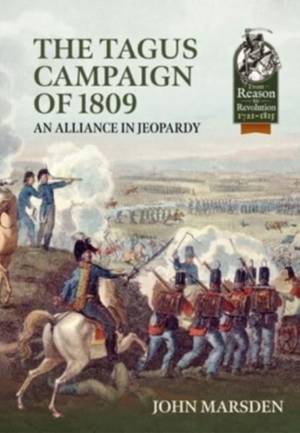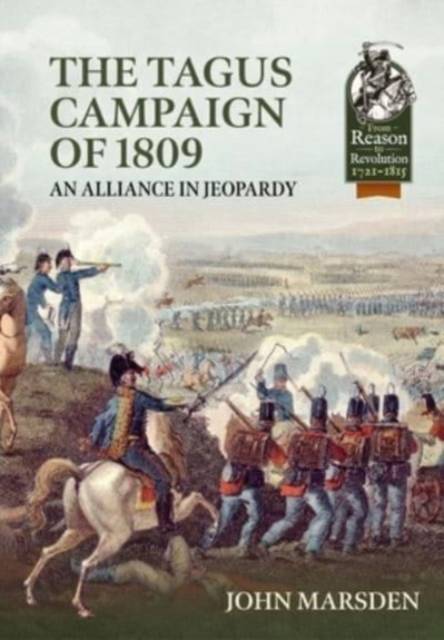
Bedankt voor het vertrouwen het afgelopen jaar! Om jou te bedanken bieden we GRATIS verzending (in België) aan op alles gedurende de hele maand januari.
- Afhalen na 1 uur in een winkel met voorraad
- Gratis thuislevering in België vanaf € 30
- Ruim aanbod met 7 miljoen producten
Bedankt voor het vertrouwen het afgelopen jaar! Om jou te bedanken bieden we GRATIS verzending (in België) aan op alles gedurende de hele maand januari.
- Afhalen na 1 uur in een winkel met voorraad
- Gratis thuislevering in België vanaf € 30
- Ruim aanbod met 7 miljoen producten
Zoeken
Omschrijving
This is the story of the first Anglo-Spanish campaign against the French during the Peninsular War, a previous attempt to launch joint operations during Sir John Moore's ill-fated expedition to Iberia having failed before the allies had an opportunity to unite.
Hardly had the ramifications of Britain's setback in her first Iberian expedition settled, before a second was launched, Sir Arthur Wellesley disembarking at Lisbon on 21 April 1809. Wellington's primary objective was the liberation of Portugal from what was, at the time, a small but significant French incursion in the north of the country. That achieved, the British commander decided to push the boundaries of his mission, as set by Castlereagh, and enter Spanish territory to link up with Gregorio de la Cuesta's scratch army on the Tagus, his aim being that of pushing Victor's army away from the Portuguese frontier and eventually liberating Madrid.
For all the significance of Wellington's presence, it could be fair to say that Cuesta was the main protagonist of the Tagus campaign. A somewhat difficult character, he fell foul of Spain's governing Junta Suprema in 1808, and was under house arrest pending trial at the time the Spanish armies were being overrun by Napoleon during his winter campaign of 1808-1809.
It was due only to the desperate predicament of Spain that the Junta decided to release Cuesta from his incarceration at Mérida and allow him to raise a scratch force which he referred to as the Army of Extremadura. It was with this army that he began the daunting task of attempting to prevent the French from crossing to the south bank of the Tagus in early 1809. By then the Junta was sitting at Seville, happy to support Cuesta's attempts to halt the French advance on the south, but seeing him as a threat to the continuation of their self-appointed interregnum position as governors of Spain.
When Wellesley entered Spain, the Junta saw an opportunity to use the British as partners in a plan to rid them of their troublesome general, their quid pro quo being the appointment of the British general as supreme allied commander. J. H. Frere, Britain's former plenipotentiary in Spain, was soon eagerly assisting the Junta with its intriguing, his friends in Seville appointing him as their chief liaison officer to the British.
So things continued whilst Cuesta was endeavoring to construct a working relationship with Wellesley in the field, but undoubtedly the Spaniard would have heard of the intriguing against him. If so, it may well explain what some writers have referred to as his lack of cooperation with his British allies. However, the Tagus campaign of 1809 may well not have taken place had Cuesta not stood as the only bar to Victor's advance towards the Guadiana and beyond during the first quarter of 1809.
An examination of the Spanish archives affords the reader an opportunity to see just how much of a positive contribution Cuesta made to the Tagus campaign, despite the despicable insubordination of General Venegas and the plotting in London and Seville against him; all of which could have served to extinguish the nascent Anglo-Spanish alliance.
All major events of the campaign are discussed in detail, including, of course, the Battle of Talavera, as well as descriptions of the battles of Medellin and Almonacid, besides much detail on lesser-known aspects, the whole supported by a number of maps.
Hardly had the ramifications of Britain's setback in her first Iberian expedition settled, before a second was launched, Sir Arthur Wellesley disembarking at Lisbon on 21 April 1809. Wellington's primary objective was the liberation of Portugal from what was, at the time, a small but significant French incursion in the north of the country. That achieved, the British commander decided to push the boundaries of his mission, as set by Castlereagh, and enter Spanish territory to link up with Gregorio de la Cuesta's scratch army on the Tagus, his aim being that of pushing Victor's army away from the Portuguese frontier and eventually liberating Madrid.
For all the significance of Wellington's presence, it could be fair to say that Cuesta was the main protagonist of the Tagus campaign. A somewhat difficult character, he fell foul of Spain's governing Junta Suprema in 1808, and was under house arrest pending trial at the time the Spanish armies were being overrun by Napoleon during his winter campaign of 1808-1809.
It was due only to the desperate predicament of Spain that the Junta decided to release Cuesta from his incarceration at Mérida and allow him to raise a scratch force which he referred to as the Army of Extremadura. It was with this army that he began the daunting task of attempting to prevent the French from crossing to the south bank of the Tagus in early 1809. By then the Junta was sitting at Seville, happy to support Cuesta's attempts to halt the French advance on the south, but seeing him as a threat to the continuation of their self-appointed interregnum position as governors of Spain.
When Wellesley entered Spain, the Junta saw an opportunity to use the British as partners in a plan to rid them of their troublesome general, their quid pro quo being the appointment of the British general as supreme allied commander. J. H. Frere, Britain's former plenipotentiary in Spain, was soon eagerly assisting the Junta with its intriguing, his friends in Seville appointing him as their chief liaison officer to the British.
So things continued whilst Cuesta was endeavoring to construct a working relationship with Wellesley in the field, but undoubtedly the Spaniard would have heard of the intriguing against him. If so, it may well explain what some writers have referred to as his lack of cooperation with his British allies. However, the Tagus campaign of 1809 may well not have taken place had Cuesta not stood as the only bar to Victor's advance towards the Guadiana and beyond during the first quarter of 1809.
An examination of the Spanish archives affords the reader an opportunity to see just how much of a positive contribution Cuesta made to the Tagus campaign, despite the despicable insubordination of General Venegas and the plotting in London and Seville against him; all of which could have served to extinguish the nascent Anglo-Spanish alliance.
All major events of the campaign are discussed in detail, including, of course, the Battle of Talavera, as well as descriptions of the battles of Medellin and Almonacid, besides much detail on lesser-known aspects, the whole supported by a number of maps.
Specificaties
Betrokkenen
- Auteur(s):
- Uitgeverij:
Inhoud
- Aantal bladzijden:
- 256
- Taal:
- Engels
- Reeks:
Eigenschappen
- Productcode (EAN):
- 9781804511909
- Verschijningsdatum:
- 30/06/2023
- Uitvoering:
- Paperback
- Formaat:
- Trade paperback (VS)
- Afmetingen:
- 170 mm x 244 mm
- Gewicht:
- 638 g

Alleen bij Standaard Boekhandel
+ 83 punten op je klantenkaart van Standaard Boekhandel
Beoordelingen
We publiceren alleen reviews die voldoen aan de voorwaarden voor reviews. Bekijk onze voorwaarden voor reviews.









